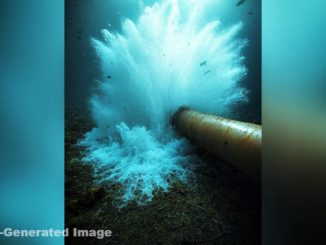
In this photo, taken from video distributed by Russian defense Ministry Press Service on Sunday, June 8, 2025, Journalists gather near the motorcade of refrigerators of the first convoy carrying bodies of Ukranian soldiers for repatriation at an exchange area near Novaya Guta, Belarus, for the beginning of a large scale exchange between Russia and Ukraine
| Published June 8, 2025
Russian officials say that Moscow is still awaiting confirmation from Kyiv on a planned exchange of 6,000 bodies of soldiers killed in action and is accusing Ukraine of delaying the process
KYIV/MOSCOW — Russia has stated it is waiting for Ukraine to confirm details for a planned exchange involving the bodies of deceased fighters from both sides, a process that has seen repeated delays amid ongoing conflict. The exchange, intended to facilitate the repatriation of remains, is part of humanitarian efforts between the two countries despite the continuing war.
Russian officials said that the negotiations have been ongoing but criticized what they describe as Ukraine’s delays in confirming the arrangements. Moscow has accused Kyiv of stalling the process, while Ukrainian authorities have not yet publicly commented on the latest developments.
The proposed exchange involves the remains of combatants who died in recent months, aiming to provide closure for families and maintain some humanitarian dialogue between the warring parties. Previous exchanges have been sporadic and complicated by the sensitive nature of the conflict and security concerns.
Humanitarian organizations and international intermediaries have called for the timely execution of such exchanges, emphasizing their importance for respecting the dignity of the deceased and easing tensions on the ground.
While the process focuses on recovering bodies, it also serves as a rare point of coordination amid broader hostilities, offering a glimpse of limited cooperation between the two sides.
The conflict, now in its fourth year, has resulted in significant loss of life and displacement. Efforts like these exchanges are closely monitored by international observers and families awaiting news of loved ones.
Russia’s demand for Ukraine’s confirmation comes amid broader diplomatic and military developments, as both sides remain entrenched in ongoing clashes across multiple fronts.


In this photo, taken from video distributed by Russian defense Ministry Press Service on Sunday, June 8, 2025, Journalists gather near the motorcade of refrigerators of the first convoy carrying bodies of Ukranian soldiers for repatriation at an exchange area near Novaya Guta, Belarus, for the beginning of a large scale exchange between Russia and Ukraine
Timeline: Russia-Ukraine Dead Fighter and Prisoner Exchanges
🔹 Early 2022
-
Conflict begins; initial informal prisoner exchanges occur sporadically between Russia and Ukraine.
🔹 Late 2022
-
First organized prisoner swaps take place, with both sides exchanging captured combatants as goodwill gestures.
🔹 Mid 2023
-
Exchanges expand to include the return of bodies of fallen soldiers, amid rising international calls for humanitarian cooperation.
🔹 Early 2024
-
Diplomatic efforts increase to regularize prisoner and dead fighter exchanges, with involvement from international intermediaries like the Red Cross.
🔹 March 2025
-
Latest major prisoner swap conducted, involving dozens of combatants; media coverage highlights families reunited.
🔹 June 2025
-
Russia announces it is awaiting Ukraine’s confirmation on a planned exchange of dead fighters; reports indicate delays and ongoing negotiations.
Here are the implications of the ongoing delays and negotiations around the exchange of dead fighters between Russia and Ukraine:
1. Humanitarian Sensitivity Amid Conflict
The exchange process highlights the delicate humanitarian aspects of the conflict, underscoring the importance of respecting the dignity of deceased combatants and providing closure to grieving families.
2. Indicator of Communication Channels
Despite deep hostilities, the negotiation over exchanges suggests that some limited communication and cooperation persist between the two sides, which could serve as a foundation for further dialogue or confidence-building measures.
3. Potential Political and Military Leverage
Delays or disputes around these exchanges may reflect broader strategic calculations, with either side possibly using the process as leverage in negotiations or as part of information and propaganda efforts.
4. Impact on Public Sentiment
The timely and respectful handling of bodies can affect public morale and the perceptions of both domestic and international audiences regarding the conduct of the war.
5. Challenges to Humanitarian Access
The repeated delays highlight ongoing obstacles to humanitarian operations in active war zones, including security concerns, mistrust, and logistical complexities.
Overall Takeaway:
The ongoing negotiations and delays surrounding the exchange of deceased fighters between Russia and Ukraine illustrate the complex interplay of humanitarian concerns and strategic calculations in the midst of intense conflict. While these exchanges provide a vital opportunity to uphold dignity and offer closure to families, they also reveal persistent mistrust and broader political dynamics shaping the war. Despite the hostilities, the process maintains a crucial, if fragile, channel of communication between the two sides.
SOURCES: AP NEWS – Russia awaits Ukraine’s confirmation on a planned exchange of dead fighters, officials say
THE ECONOMIC TIMES – Russia awaits Ukraine’s confirmation on a planned exchange of dead fighters, officials say
ASHARQ AL-AWSAT – Russia Awaits Ukraine’s Confirmation on Planned Exchange of Dead Fighters, Officials Say
ABC NEWS – Russia continues to accuse Ukraine of delaying planned exchange of dead fighters





Be the first to comment